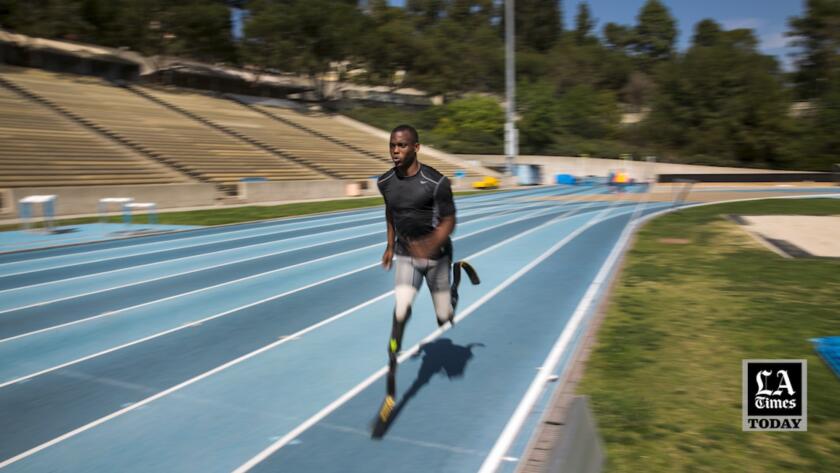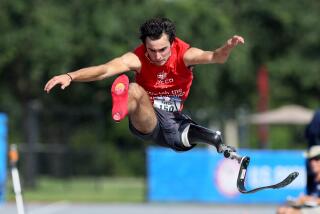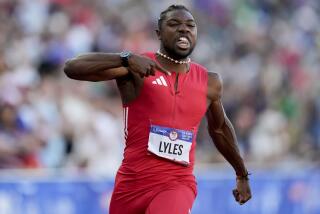Blake Leeper runs for redemption, and a place in the Paralympics and Olympics
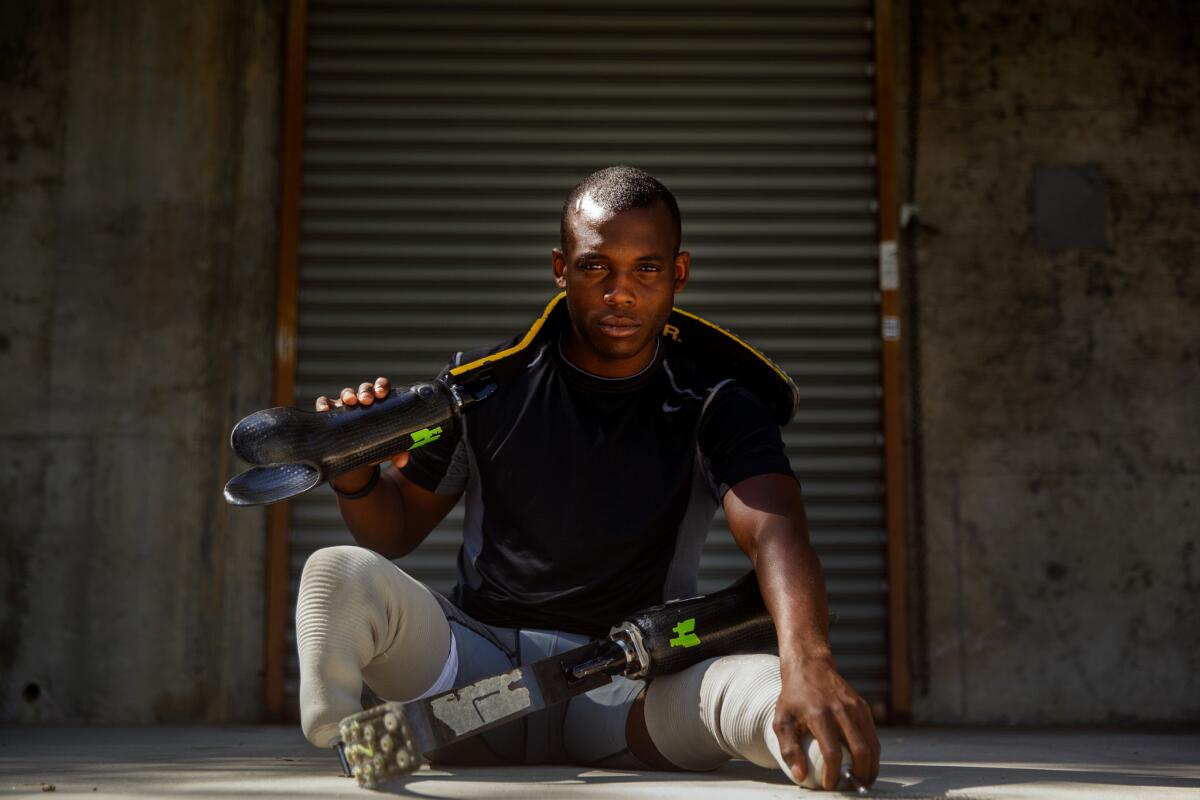
Blake Leeper, photographed at the UCLA Drake Track Stadium, in Los Angeles.
- Share via
It wasn’t the first time Blake Leeper had received an email from the U.S. Anti-Doping Agency.
As a top Paralympic sprinter — a young man who could fly down the track on sleek, artificial legs — Leeper had been drug-tested regularly and seen lots of messages from the agency.
But when a USADA email popped up on his cellphone in the summer of 2015, he sensed trouble.
“Worst feeling of my life,” he says.
The man from Tennessee had shot up the ranks of his sport as a relative newcomer, running fast enough to win silver and bronze at the 2012 Paralympics in London. Natural-born speed was only part of the story.
His down-home charm earned him television appearances and a roster spot in the celebrity game at NBA All-Star weekend. There was a book deal and movie in the works.
Then Leeper opened the USADA email and read that he had tested positive for a banned stimulant called benzoylecgonine. He had to look it up on the Internet.
“Cocaine,” he says. “I was sick to my stomach.”
Though it wasn’t a performance-enhancing drug — authorities would later acknowledge he wasn’t trying to cheat — the offense carried a potential four-year ban, which could effectively end his career. And that wasn’t the worst part.
For years, Leeper had kept a secret, even among family and coaches. Now, he would have to tell the world.
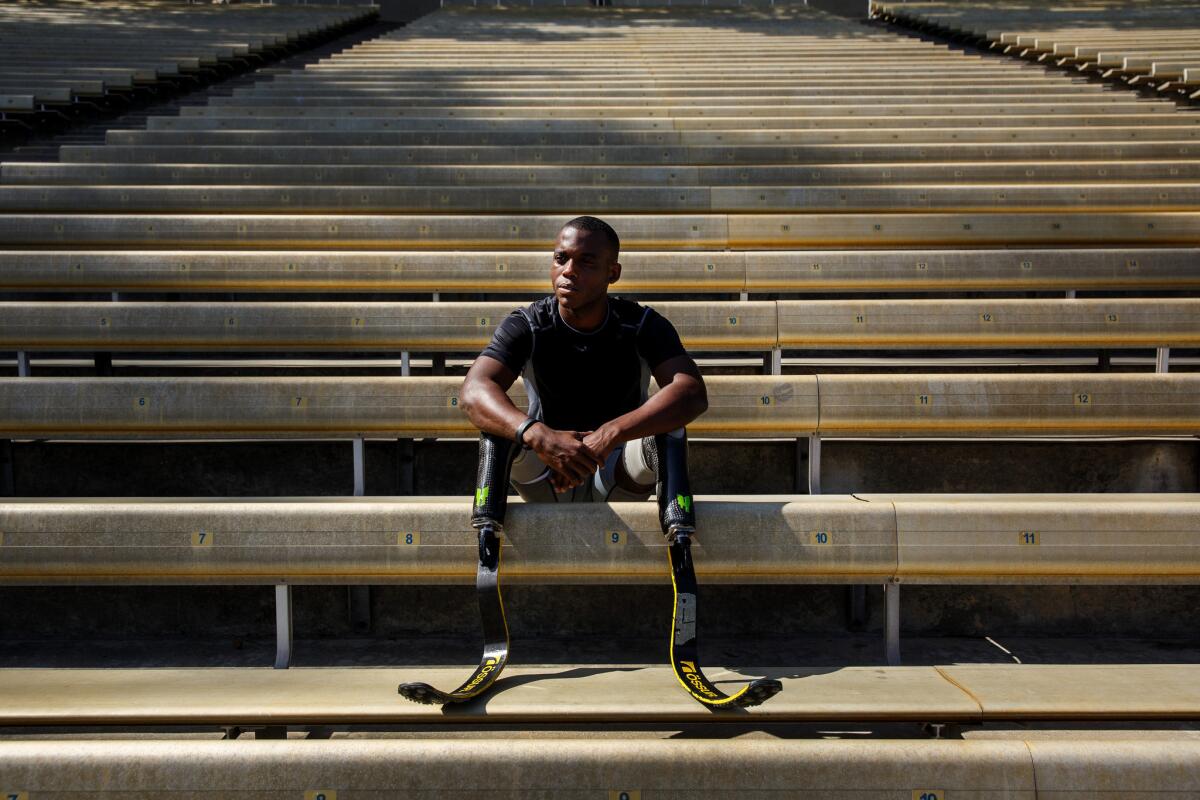
Paralympic sprinter Blake Leeper sits in the stands at the UCLA Drake Track Stadium.
For years, Leeper had kept a secret, even among family and coaches. Now, he would have to tell the world.
::
Sweat soaks through Leeper’s shirt as he finishes another sprint in the midday sun. He bends over, hands on hips, breathing hard.
Banished from the U.S. Olympic Committee training center where he had lived for the past several years, the 26-year-old now runs each day on the track at UCLA. Thoughts of a comeback sustain him.
Leeper hopes to qualify for both the 2016 Paralympics and Olympic Games in Rio de Janeiro this summer.
The quest has him fighting two battles: Regaining his eligibility before the Paralympic and Olympic trials in four months, and working on the track to shave more than a second off his best 400-meter time.
“I know the odds are against me,” he says. “But I’ve beaten the odds before.”
Challenges come naturally to someone born without calf bones, ankles or feet, someone who grew up compensating for his disability with a tenacious smile and a determination to play in all the neighborhood games.
As a kid, Leeper could swing a bat and shoot a basketball as deftly as anyone in Kingsport, Tenn. If his rudimentary artificial legs slowed him down, if they occasionally slipped off as he rounded second base, he made sure to grin as if it did not matter.
Off the field, life was not as easy.
Even on the hottest Southern days, a young Leeper hesitated to wear shorts. When he finally did, putting them on for a junior high school dance, he figured his classmates would understand.
“As soon as I walked in, it was like the music stopped,” he says. “Everybody was staring. I’ll never forget.”
The older he grew, the tougher it became to shrug off insecurities. When he was 15, his grandfather gave him a drink and the alcohol made him feel strong. He recalls: “Whew, I didn’t care what anyone thought.”
His cheery persona helped conceal a problem that grew steadily worse through high school. Leeper was a happy drunk, the life of the party, so no one really noticed the difference.
Running almost saved him from alcoholism. Halfway through college, eager to return to sports, he wrote to a California foundation and was awarded a grant for a pair of $30,000 carbon-fiber prosthetics.
To everyone’s surprise — including his own — he soon earned a spot on the national Paralympic team and a room at the USOC center in Chula Vista, where his drinking subsided as he trained beside some of the world’s best athletes.
A few years later, Leeper finished second to Oscar Pistorius in the 400 meters at the Paralympics. He also watched Pistorius — who would subsequently be convicted of murder — become the first double amputee to sprint in the Olympics that summer.
Leeper returned from London to television spots, speaking engagements and a walk down the red carpet at the ESPY Awards. This newfound celebrity brought money, which allowed him to move from the Chula Vista dorms to a nearby apartment.
And that was where he fell back.
It was partly habit, partly ego and partly those old insecurities rising up. He felt the pressure of being a spokesman for all disabled athletes.
I would run in the morning, then skip the weight room and go straight home. There would be a 12-pack waiting for me.
— Blake Leeper
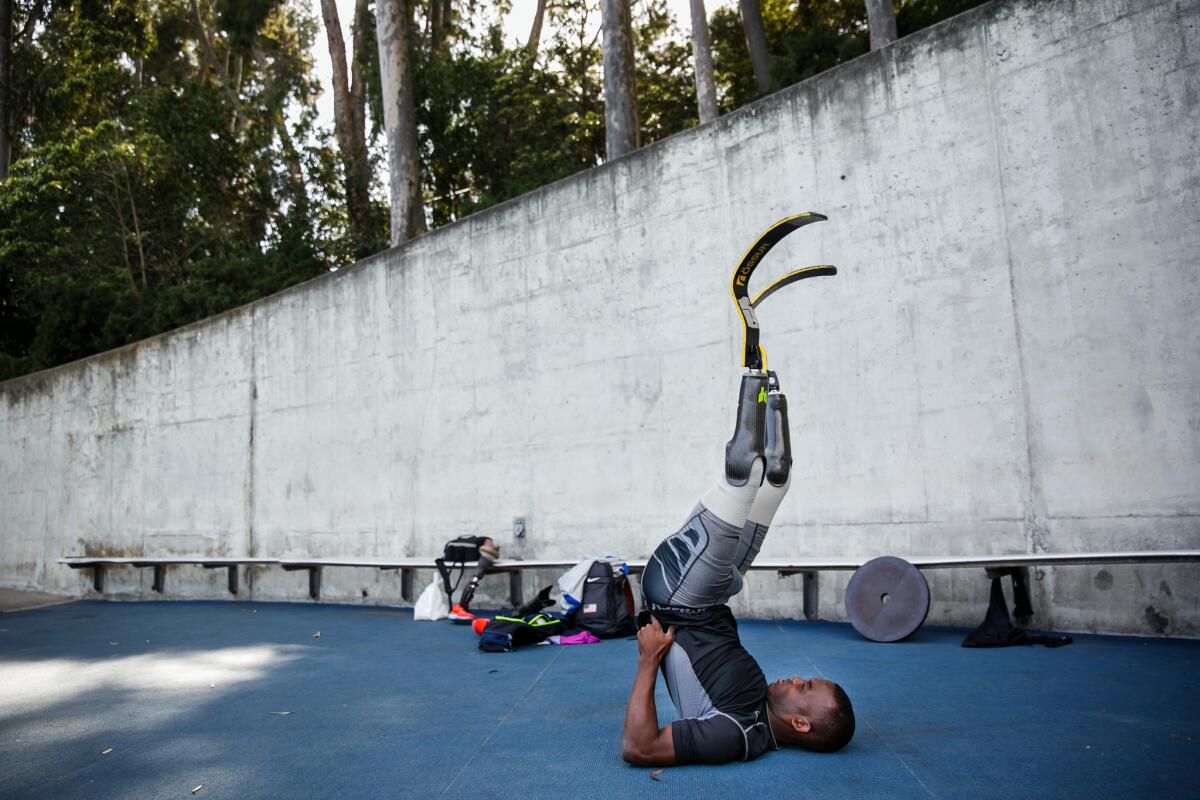
Paralympic sprinter Blake Leeper warms up at the UCLA Drake Track Stadium.
“I would run in the morning, then skip the weight room and go straight home,” he says. “There would be a 12-pack waiting for me.”
His teammates began to view him as a prima donna and his coach, former Olympic champion Al Joyner, mistook him for lazy. If anyone guessed the truth, they did not confront him.
“If I had known,” Joyner says, “I would have locked him up.”
::
Someone brought cocaine to the party. Just back from taping the “Who Wants to Be a Millionaire” game show on the East Coast, Leeper ran the calculations in his head.
The 2015 Paralympic national championships were about a week away, which seemed long enough for the drug to pass through his system. He figured, what the hell.
“Once I have that first drink,” he says, “I start making bad decisions.”
This is what he failed to realize: Alcohol makes the liver function less efficiently, so that metabolite of cocaine showed up in the urine test he took after running at nationals.
His parents cried on the phone. USOC officials told him what he already knew: Banned athletes were not allowed at the training center. “I thought my life was over,” he said.
Joyner and others vowed to stick by him if he stopped drinking, but Leeper needed more than encouragement. He needed a lawyer for the doping case and money to pay rent. Then help came.
Bob Lorsch is a Los Angeles entrepreneur who made millions in advertising and sales promotion. He has a history of philanthropy that extends to such disparate causes as the Thalians, the California Science Center and the Wildlife Waystation in Angeles National Forest.
Sports never meant much to a man who stands short and stout at 65. Lorsch says: “I’m certainly not a runner.” But he had fond memories of meeting Leeper at a charity event and — just as important — has always considered himself a sucker for desperate causes.
“Blake was about to lose everything,” he says. “I was his last hope.”
Lorsch began calling in favors. A private foundation agreed to cover Leeper’s living expenses and a Westside clinic agreed to treat him. A prestigious law firm signed on to represent him pro bono.
As the days passed in increments of long talks, a bond formed between Leeper and Lorsch. Neither can fully explain it.
For this wealthy Jewish man from L.A. to help out a black kid with no legs from Tennessee, what the heck is going on?
— Blake Leeper
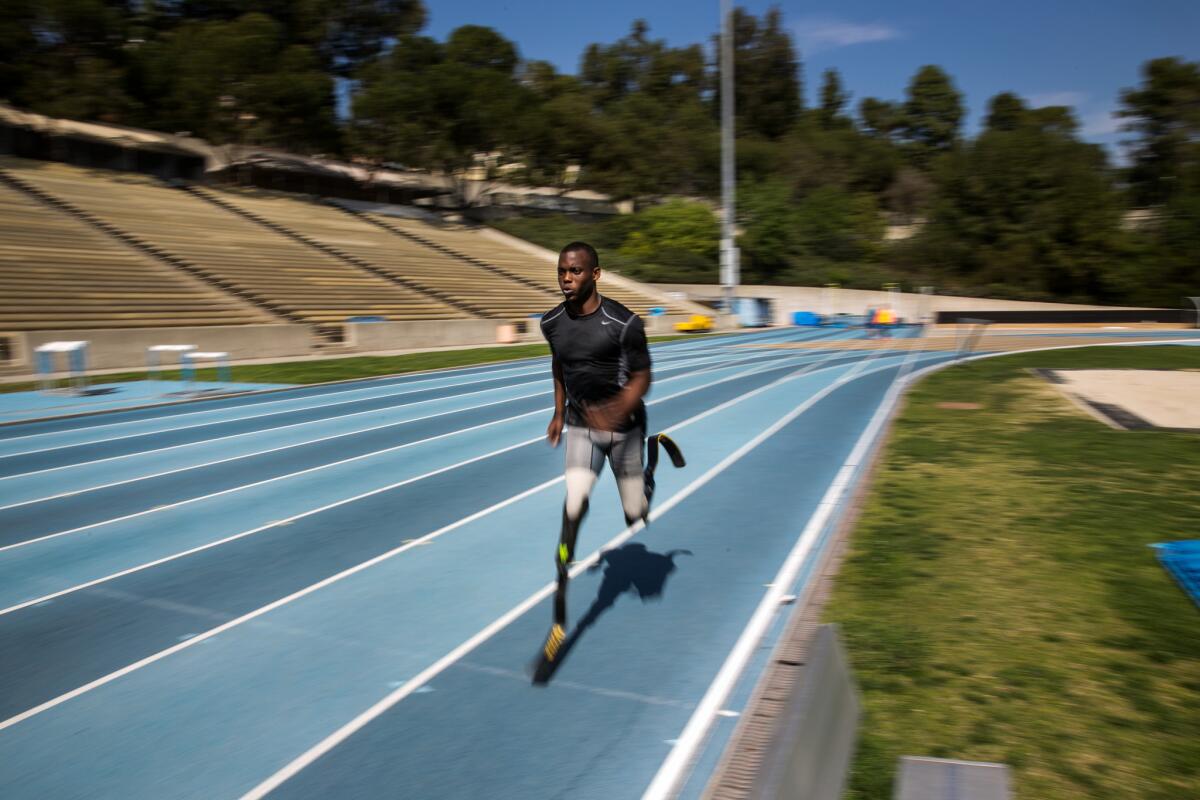
Paralympic sprinter Blake Leeper runs at the UCLA Drake Track Stadium.
“For this wealthy Jewish man from L.A. to help out a black kid with no legs from Tennessee, what the heck is going on?” Leeper says. “It doesn’t make sense.”
Lorsch says only: “You can’t help but like Blake.”
In January, after lengthy negotiations, USADA agreed to set Leeper’s suspension at one year from the date of his June 2015 positive sample, which would make him eligible for the Paralympic and Olympic trials this summer.
But in the fragmented world of amateur sport, the International Paralympic Committee subsequently refused to accept the settlement. Leeper’s attorneys now plan to mount an appeal through the international Court of Arbitration for Sport.
In the meantime, Leeper must keep training and stay clean.
::
Each day begins with a prayer.
“My other legs,” he says. “Before I put on my prosthetic legs for walking, I put on my recovery legs, spiritually and emotionally.”
At 7:30 a.m., Leeper attends his first 12-step meeting of the day. An hour later, he drives to the Westside clinic for a urine test and therapy.
David Bresler, a former UCLA associate professor who specializes in psychology and pain management, treats Leeper with a mix of counseling, acupuncture and high-tech electronic equipment.
There is evidence that 85% to 90% of alcoholics experience at least one relapse in the first four years after treatment, according to the National Institute on Alcohol Abuse and Alcoholism. Bresler has talked to Leeper about the road ahead and the pressure of competitive athletics.
“When you don’t win a big race, it can be devastating,” Bresler says.
But track gives Leeper a sense of identity and purpose. After meeting with Bresler, he heads straight for UCLA.
On this particular day, his regimen consists of five consecutive sprints at varying distances. Joyner still meets with him on weekends; during the week, former Olympian and NFL receiver Willie Gault trains him.
If arbitrators restore Leeper’s eligibility in June, he will have only two or three meets to satisfy the Olympic trials qualifying time. Gault pushes him to pump his arms harder and run faster.
“Blake never complains,” the coach says. “Some days he is sore, but he does everything I ask.”
Few people in Leeper’s situation get the sort of aid that has come his way. Not wanting to take it for granted, he tries to resist cravings for fast food and forces himself to lift weights three times a week, enduring the drudgery he used to avoid.
There is only one way he can make things right: Run, stay clean and tell his story.
Others might learn from his mistakes, he thinks. If he can make a comeback, if he can qualify for the Olympics, they might be inspired.
Gym work is followed by an early dinner, another recovery meeting and the last of his daily calls to Lorsch. Leeper watches television in his West Los Angeles apartment before falling asleep around 9:30 p.m.
“I have good days and bad days,” he says. “Welcome to the real world.”
Twitter: @LATimesWharton
- Share via
Watch L.A. Times Today at 7 p.m. on Spectrum News 1 on Channel 1 or live stream on the Spectrum News App. Palos Verdes Peninsula and Orange County viewers can watch on Cox Systems on channel 99.
More to Read
Go beyond the scoreboard
Get the latest on L.A.'s teams in the daily Sports Report newsletter.
You may occasionally receive promotional content from the Los Angeles Times.

